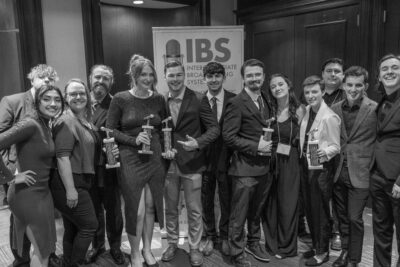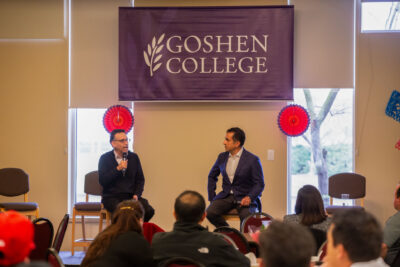The weekend before fall break, six students traveled to New York City for the United Nations-Mennonite Central Committee (MCC) seminar.
Dona Park and Keshia Ward, seniors, and Simelwe Dlova, Kyle Stocksdale, Chelsea Risser and Hitesh Sharma, juniors, spent three days listening to people from the U.N. and MCC talk about their work in Haiti following the earthquake in 2010.The conference focused on what these organizations have done on the ground in Haiti as well as the cholera outbreak that was a result of Nepalese U.N. Peacekeepers who hadn’t had proper health screenings before going to Haiti. For Sharma, an international student from Nepal, it was a shock to learn this.
“It is such a shame that I did not know about Haiti, even though my people were partly responsible for bringing cholera there,” he said. “To see how bitter the people were towards my country, which is sort of justified, was really disheartening.”
The conference shed light on other shortcomings, like the refusal of the U.N. to acknowledge their role in the cholera outbreak for years. Stocksdale found that discouraging.
“Seeing how an organization like the U.N., which I had previously assumed is a global voice for peace, is inherently flawed [was challenging],” he said. “It often looks out for its own interests more than the needs of people in these countries that they’re working in.”
Despite the negative side of the U.N. that Stocksdale saw, he was surprised at the complexity of working with a government organization.
“Being able to take in a broad array of perspectives and interests and trying to find the spots where you can gain leverage in this sea of complexity that is the U.N. and foreign affairs [will stick with me],” he said.
Stocksdale sees a potential future of working for an organization like MCC, and this conference gave him a new way of looking at this complexity.
Risser went into this seminar thinking the “U.N. system has always been based on corruption.” During her time, that mindset didn’t change drastically, but she saw some positives of people working within the U.N.
“I wanted to go to the U.N. to find examples for why the U.N. is corrupt and understand better how to deconstruct the system to bring the focus back to social justice,” Risser said. “I also wanted to form a more holistic view of the U.N. and understand the good work people are doing within the system too.”
She walked away with the knowledge that she could not work for a system like the U.N. Risser would prefer a Grassroots organization, such as MCC.
Park also found herself learning a lot from this conference.
“The most rewarding thing about the seminar was to learn,” said Park. “I felt my brain expanding as new information about the world, particularly Haiti, as well as the work of human rights advocates at MCC and other international organization representatives, [was presented].”
The students who went to the seminar want the Goshen community to educate themselves about the issues in Haiti and take action. They suggest checking out the Face Justice campaign that MCC is helping run. This campaign puts pressure on the U.N. and the U.S. government to act to solve the cholera crisis and accept the responsibility.
The U.N.-MCC seminar is offered each year with a different focus, and all GC students are welcome to apply for a spot. Jan Bender Shetler, professor of history, and Joe Liechty, professor of peace, justice and conflict studies, are in charge of getting the GC group around for the seminar.
“This is a fantastic opportunity for students to see how the U.N. works from the inside and hear speakers working for the U.N. as well as other advocacy organizations,” Shetler said.
Liechty had similar things to say.
“It is always so well organized,” Liechty said. “I can’t imagine a quicker, better way to gain insight into how the U.N. works generally and how MCC and the U.N. are approaching the particular issue the seminar addresses that year.”

